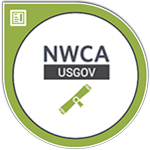PURPOSE
The American History & Government credential documents the essential understanding of American government and U.S. history from the early new world discovery through today including an understanding of the organization, structure, and function of the U.S. government as well as the major events, key players, politics, policies, and their impact on American society, culture, and international relationships.
AUDIENCE
This credential is appropriate for a variety of professionals including history and government high school and post-secondary teachers, researchers, historians, museum professionals and technicians, government employees, policy makers, political scientists and analysts, journalists, workers in historical sites and organizations, and general business professionals.
JOB/CAREER REQUIREMENTS
The American History & Government credentials denote various competencies including an understanding of how the government works, how it is organized, and how it functions to meet the numerous needs of the American public including domestic, economic, and foreign policy making. History competencies include an understanding of how historical events, key players, politics, policies, and other activities have impacted American society and culture, today’s policies and trends, and decision making for the future. Though many government and history professionals require a graduate degree in a specific area, many entry-level positions and business and government positions require only an understanding of the topic areas.
AMERICAN HISTORY & GOVERNMENT WORKPLACE TASKS:
- Government workers are employed by numerous agencies of the federal, state, and local governments for a variety of purposes. These workers often must know how the government works, how policy is made, and how the agency works to meet the needs of the public.
- Political scientists research political subjects, collect and analyze data, evaluate the effects of policies and laws, monitor current events and policy decisions, and make forecast of trends. They also use the findings to write reports, make presentations, and publish articles.
- History and government teachers develop curriculum and syllabi, teach courses at the high school and post-secondary levels and advise students on academic and career related topics
- History and government teachers at the post-secondary level conduct research and write articles and make presentations on findings
- History specialists and historians gather historical data from a variety of sources, analyze and interpret it, and often engage with the public through educational programs and presentations.
- History specialists and historians work in museums, visitor centers, historical sites, and associations to archive and preserve materials and artifacts
- Anthropologists and archeologists study the origin, development, and behavior of humans by examining cultures, languages, archeological remains, and physical characteristics of people in specific areas
- Journalists must have an understanding of government and history to write insightful articles
- Editors must have an understanding of government and history to ensure published works are accurate, to ask the write questions, and to monitor quality and industry needs
- History specialists and historians provide advice and guidance on topics within their expertise area to government agencies, preservation professionals, museums, and news organizations
- History specialists and historians write reports, articles, books, scripts, and presentations on history related topics
- Museum workers assist in authentication, appraisal, preservation, and maintenance of historical documents and materials
- Museum workers and librarians create, maintain, organize, classify, and safeguard historical records and related materials
- Museum workers help arrange, exhibit, and maintain museum collections and assist in educating museum visitors
- Museum workers and technicians design, organize, and conduct tours and workshops on history topics for the public
- All professionals can improve their input into business, industry, government, and science by understanding American government and history perspectives and principles.
EXAM STRUCTURE OVERVIEW
Number of Questions in Exam: 380
Time Limit for Exam Parts:
- American Government: 120 items
- American History—New World through Reconstruction: 130 items
- American History—The American West through Today: 130 items
Total Time: 320 minutes
Overall Passing Score: 70%
(All sections require an individual passing score of 70%)

